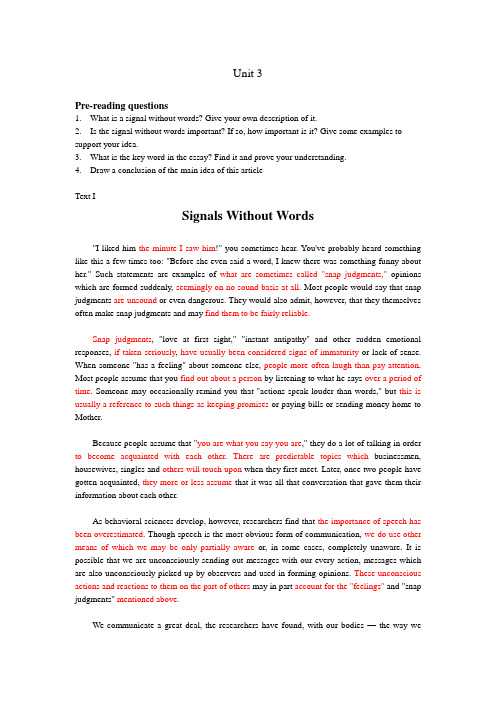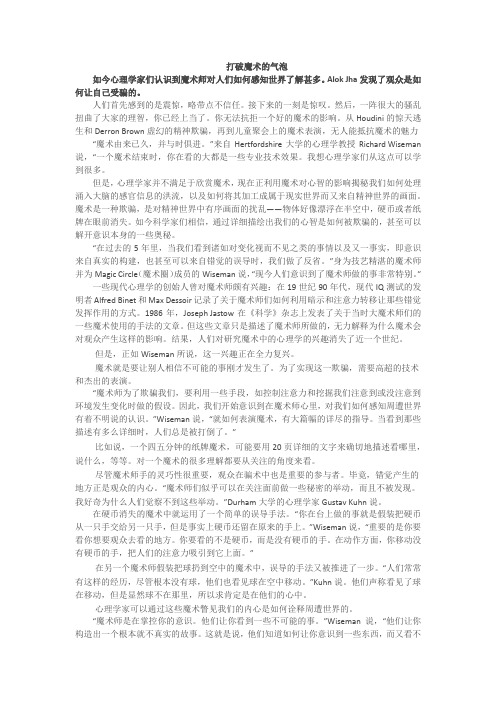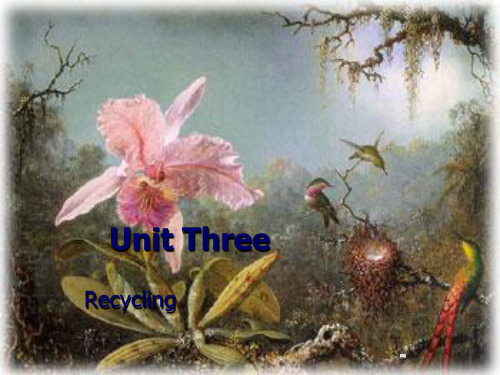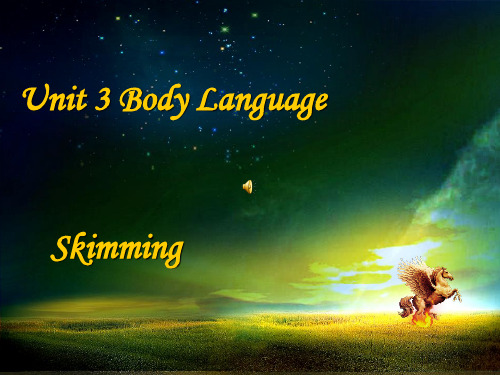英语泛读教程 第三册 Unit Three
unit3 英语泛读教程第三册

Unit 3 Bursting the Magic BubbleⅠObjectives1. Understanding the text2. Mastery of some language points3. Learning something about magic4. Learning the scientific principles behind the magic performanceⅡKey points1.Full understanding of the text3.Explanation of some difficult words3. Learning the scientific principles behind the magic performancebehind the magic performance.2.Some wo rds might cause difficulty in students’ understanding of the textAbout two periods of class will be used for the analysis and discussion of the passage itself.Total class hours: three periodsAsk some students to perfume some simple magic tricks (they should prepare before the class) in front of the whole class. Let them guess where the tricks lie. 2. Warm-up questions(1)Do you like watching magic performance? Why?(2)Which magician do you like bet?(3)Which magic trick do you like to watch best?3. Related information(1) Magic may refer to:Magic (paranormal)anything that is not naturally explainable by any laws of nature. Magical thinkingFolk magic, traditional systems of magicMagick, the magical system of Aleister Crowley and ThelemaWitchcraft, the use of certain kinds of supernatural or magical powersMagic (illusion), the art of entertaining audiences by performing illusions and tricks Street magic, sleight of hand, etc.(2) Magic may be inIn fantasy fictionIn science and mathematics:In gamesIn popular cultureIn computing programming:Among radio stations(3) Famous magiciansWhat and who do you think of when asking about famous magicians?For most of us, the image is of a finely dressed man in a tuxedo or suit, possibly with a top hat, a magic wand and a handkerchief - the magician's uniform of choice.However, whilst some famous magicians do use this attire, not all magicians have conformed to this stereotype - indeed, sometimes their tricks required far less in the way of clothing, but still with their modesty intact, of course.Over the years, there have been so many famous magicians, actually too numerous for them all to get a mention, so we will concentrate on some of the more well known ones.All of these famous magicians have brought their own unique style to performing magic, illusions, tricks and escapology.Harry Houdini - probably one of the most famous magicians of them all, well known for escaping chains, ropes, handcuffs and straitjackets.David Copperfield - renowned for his spectacular illusions, including making the Status of Liberty disappear from view.Siegfried and Roy - famous magicians probably best known for their use of white tigers in their spectacular stage shows.Lance Burton - a popular American magician and also the first American to win the "World Championship of Magic".Doug Henning - a famous magician born in Canada. A colourful character with his brightly coloured clothes, thick moustache and long hair.David Blaine - initially known for his street magic, he now performs somewhat bizarre stunts such as being encased in a block of ice for over 60 days.Penn and Teller - a double act of famous magicians who are somewhat eccentric in their performances, enraging other magicians for publicly revealing how some tricks are done.Derren Brown - a prominent mind control performer who leads audiences along with subtle hints and psychological techniques, often to great effect.(4)David CopperfieldThe best known and richest magician-he ranks among the wealthiest of all entertainers-David Copperfield is a household name. He is known to millions through his numerous television specials over the last couple of decades and he continues to tour, taking his show around the country.Takes to Magic: Copperfield was born in New Jersey on September 16, 1956. He started as a ventriloquist and then quickly took to magic. Copperfield became theyoungest magician admitted to the Society of American Magicians (SAM). At age 16, he taught a magic course at New York University. When he was 18, Copperfield was cast as the lead in a Chicago production called “The Magic Man.”Network Magic Specials: His many magic specials have aired on network television over the past two decades, bringing his brand of illusion and magic to millions. Copperfield not only performs with large illusions, his shows typically feature a major magical feat.The Magic of David Copperfield ?a great way to describe one of the most spectacular illusionists of our time. His magic talent begin at an early age where he billed himself as 揇avino, the Boy Magician?and he was the youngest person ever to be admitted to the Society of American Magicians at age 14.The magic of David Copperfield was so good he was also teaching the subject at New York University when just 16 years of age. Originally David Kotkin, it wasn抰until he was 18 years old that he decided on the stage name David Copperfield.He got his break into television just a year later, but it was a few years after that when The Magic of David Copperfield series was commissioned.The Magic of David Copperfield 3 that saw the levitation of a Ferrari, an illusion that could have cost David his life as when only three feet in the air, the car fell.Making The Statue of Liberty disappear was performed in The Magic of David Copperfield 5. This amazing illusion involved a live audience sitting in front of two towers, and between them, in the distance was The Statue of Liberty. A curtain was raised using the two towers and when lowered, amazingly the Statue had disappeared.By now, The Magic of David Copperfield was getting huge audiences.Walking through The Great Wall of China was another superb illusion performed in The Magic of David Copperfield 8. A covered frame is placed next to the wall and a light shone from behind. David enters the frame and, as a silhouette, is seen to disappear into the wall. On the other side of the wall, a similar frame is constructed and a silhouette is seen to appear out of the wall before David removes the curtains to reveal himself.In The Magic of David Copperfield 13, he performs Mystery On The Orient Express where a carriage of the Orient Express is covered with a huge curtain, the carriage is then levitated before the curtain is removed to reveal the carriage has disappeared.David performed his most remarkable illusion to date in The Magic of David Copperfield 14. He mimics the take-off of a bird, and then starts to fly and swoop around the stage. Hoops are then rotated around his body to show there are no wires before he enters a glass case and levitates in the, now lidded, case.(5) Summary of magicThe art of magic and conjuring has been prevalent for hundreds if not thousands of years, baffling and astounding audiences with tricks that convince them the impossible has been achieved. This sort of magic, commonly called street magic, is highly respected due to the closeness the illusionist must keep with his audience. Although the veil of secrecy is usually impenetrable amongst magicians, it is possibleto work alongside a professional magician or illusionist and learn from his techniques.4. Text analysisTwo psychologists ’ researches and comments:Wiseman ---professor of psychology and an accomplished magicianKuhn ---psychologistMagicians’ tricks (secret action, deception) ---phenomenon----magicAudience ’s reaction (brain activities) ---why? ---scienceHistory of magic research and unsolved mysteryRecent development and discoveryFuture goal and direction of future research5. Key words and phrases(1) magic/magician (2) scramble (3) expertise (4) disruption (5renaissance) (6) assumption (7dexterity)(8)manipulate(9) sleight of hand(10) autism(11) get to grips with(12) illusion6. Questions for discussion(1) Du you agree that the appeal of magic is universal? Why?(2) What implications do you think the scientists’ research in magic tricks might have to our ways of perceiving the world around us?7. Exercises about text A8.. Fast Reading & Exercises2. Preview Unit 4。
英语泛读unit3

It’s easy to make it in London so long as you don’t
by
do anything convenient or pleasurable
Step
The Londoners believe:
A city is a noble and costly test of endurance.
Do You Know
?
Passage A
London rains a lot. The rain made rubber boots a very common sight on people's feet.
London has a temperate marine climate, so the city rarely sees extremely high or low temperatures. “London Fog” is popular due to the foggy climate in London England.
Passage A
Do You Know
?
Trafalgar Square is a square in central London, England. Its trademark is Nelson's Column which stands in the centre and the four lion statues that guard the column. Statues and sculptures are on display in the square, including a fourth plinth displaying changing pieces of contemporary art, and it is a site of political demonstrations.
泛读教程 Book III Unit 3 Signals Without Words

Unit 3Pre-reading questions1. What is a signal without words? Give your own description of it.2. Is the signal without words important? If so, how important is it? Give some examples to support your idea.3. What is the key word in the essay? Find it and prove your understanding.4. Draw a conclusion of the main idea of this articleText ISignals Without Words"I liked him the minute I saw him!" you sometimes hear. You've probably heard something like this a few times too: "Before she even said a word, I knew there was something funny about her." Such statements are examples of what are sometimes called "snap judgments,"opinions which are formed suddenly, seemingly on no sound basis at all. Most people would say that snap judgments are unsound or even dangerous. They would also admit, however, that they themselves often make snap judgments and may find them to be fairly reliable.Snap judgments, "love at first sight," "instant antipathy" and other sudden emotional responses, if taken seriously, have usually been considered signs of immaturity or lack of sense. When someone "has a feeling" about someone else, people more often laugh than pay attention. Most people assume that you find out about a person by listening to what he says over a period of time. Someone may occasionally remind you that "actions speak louder than words," but this is usually a reference to such things as keeping promises or paying bills or sending money home to Mother.Because people assume that "you are what you say you are," they do a lot of talking in order to become acquainted with each other. There are predictable topics which businessmen, housewives, singles and others will touch upon when they first meet. Later, once two people have gotten acquainted, they more or less assume that it was all that conversation that gave them their information about each other.As behavioral sciences develop, however, researchers find that the importance of speech has been overestimated. Though speech is the most obvious form of communication, we do use other means of which we may be only partially aware or, in some cases, completely unaware. It is possible that we are unconsciously sending out messages with our every action, messages which are also unconsciously picked up by observers and used in forming opinions. These unconscious actions and reactions to them on the part of others may in part account for the "feelings" and "snap judgments" mentioned above.We communicate a great deal, the researchers have found, with our bodies — the way wemove, sit, stand and what we do with our hands and heads, for example. Imagine a few people sitting in a waiting room: one is drumming his fingers on his briefcase, another keeps rubbing his hands together, another is biting his fingernails, still another grasps the arms of his chair tightly and a final one keeps running his fingers over his hair. These people aren't talking, but they're "saying" a lot if you happen to know the "language" they're using.Two of the most "telling" forms of behavior are driving a car and playing games. It is interesting to note a person's reaction to stress in these situations and to aggressive behavior in others. If he easily becomes angry, excited, passive or resentful when driving or playing, you may have a clue to his personality.Like many other forms of behavior, how you dress tells a lot about you. While clothing serves a purely practical function, it also communicates many things about your social status, personality, state of mind and even your aspirations and dreams. The eleven-year-old girl who dresses like a college student and the forty-year-old woman who dresses like a teenager are saying something by means of what they wear. According to studies, what you communicate through your mode of dress definitely influences others to accept the image of you that you are projecting: in the business worlds, the person who dresses like a successful manager is most likely to be promoted into a managerial position sooner or later.Also significant are the ornaments a person wears: buttons, medals, jewelry, etc. Such ornaments are often the means by which a person advertises a variety of things about himself: his convictions (campaign buttons), his beliefs (religious tokens), his membership in certain groups (club pins or badges), his past achievements (college ring or Phi Beta Kappa key) and his economic status (diamond jewelry).Some studies have shown that there is a correlation between a person's color preferences and his personality. Yellow, for example, is favored by intellectuals, while purple is especially preferred by romantics. What colors do you like to wear and decorate your home with? You're probably communicating a lot about yourself through your choices. Do some colors attract you or annoy you or remind you of someone? These reactions could tell you something about yourself or about that other person. Colors that attract or annoy you may represent personality traits that have the same effect on you. A color which reminds you of someone may represent certain of his personality traits, as perceived by you.Another indicator of a person's character is said to be found in his preferences in architecture and furniture. A person who really would like to live in a castle would probably be more at home in the Middle Ages. Lovers of Victorian family houses and furniture might secretly welcome a return to more rigid social norms. People who 【are content with contemporary design】are probably well-adapted to modern life-styles.You see a person for the first time. Even though he doesn't speak to you, you begin observing him: his actions, his stance, his clothing and many other things. There's a wealth of information there if you know how to "read" it. Perhaps snap judgments aren't so unsound after all.Key and Difficult Language Points in Teaching1. snap judgments:2. sound basis: very reasonable/ dependable/ firmly established basis3. instant antipathy: feeling of dislike aroused suddenly4. …, but this is usually a reference to such things as keeping promises or paying bills or sending money home to Mother: with this sentence, the author means that the proverb “actions speak louder than words” is usually used when people talk about things like keeping promises or paying bills or sending money home to Mother, and it is usually not used to refer to the fact that you can get to know a person better by observing his behavior5. become acquainted with: get familiar with6. touch upon: mention or deal with a topic briefly7. overestimate vs underestimate8. account for: explain9. in part: partially10. drumming his fingers: making a drum-like sound with fingers11. aspiration: ambition12. be more at home: feel more at ease13. traits: features of a person’s personality or character as in personality trait/ psychological trait, and so on.14. rigid social norms: very strict social conventions that every member of a community is supposed to follow or observe15. be well-adapted to modern life-style: be able to adapt to modern life-style well16. sound/ unsound judgment: a judgment that is reasonable/ unreasonableAfter-reading workshopIf snap judgments aren’t quite unsound, are they decisive in our dealing with matters? How likely can they be decisive? Please make your investigation to tell it.。
泛读教程第三册答案

Keys to Reading Course 3Unit 1 Reading StrategiesSection AWord Pretest1-5. BCBBB 6-10.AACCBReading Skill2-5. CBCA 6-9. BBAAVocabulary Building1.a. practicable/practicalb. practicec. practicesd. practicable/practicale. practiced a. worthless b. worthy c. worthwhile d. worth e. wortha. varyb. varietyc. variationd. various/variede. Variousa. absorbingb. absorbedc. absorbd. absorptione. absorbent2.1. a. effective b. efficient c. effective2. a. technology b. technique3. a. middle b. medium c. mediumClozegoing/about/trying expectations/predictions questions answerspredictions/expectations tell know/foretell end develop/present worthSection B1-5. TFTTC 6-10. BCCTF 11-14: FCAAC 16-17: CA Section C1-5. FFTFF 6-8. TTTUnit 2 EducationSection AWord Pretest1-5. ABACC 6-8. ABAReading Skill4-6. CBB 1-6. FTFFTTVocabulary Building1.mess2. preference3. aimlessly4. remarkable/marked5. decisive6.shipment7. fiery8. physically9. action 10. housing2.1. a. aptitude b. attitude2. a. account b. counted c. counted3. a. talent b. intelligenceClozeother just/only has some/many than refusesee/know/understandthat without If ready/willing/educated/taught wrong/incorrect/erroneousSection B1-5. ACCCC 6-10. CCCAC 11-14: BABASection C1-6. CCDDACUnit 3 Body LanguageSection AWord Pretest1-5. ABCCB 6-9. DCDCReading Skill2-5. BABC 6-10. ACCBCVocabulary BuildingUse of English1.Noun Verb Adjective Adverb admission admit admissible admissiblyreliance rely reliablereliablydefinition define definitedefinitelyassumption assume assumed/assuming assumedly/assuminglybehavior behave behavioral behaviorally variety vary various/variedvariously/variedlypart/partiality part partialpartiallymanager/management manage managerial manageriallycorrelation correlate correlative correlatively adaption/adaptation adapt adaptive adaptively2.1. a. inspired b. aspired c. inspired2. a. token b. badges c. token3. a. contemporaries b. temporary c. contemporary Clozecommunicate ways/means//ones using/saying in ofmessagemeet/have/encounter/experience causes meaning toSection B1-5. BABBA 6-10. CFFTT 11-15: TFCCBSection C1-5. BBDDB 6-10. CCAFF 11-14. TFFTUnit 4 AnimalsSection AWord Pretest1-5. CACAA 6-10. BBBCCReading Skill2-5.BBAC 6-10. BCCAAVocabulary Building1.1. moist2. betrayal3. exclusively4. inhumane5. amazed/amazing6.endangered 7. marvels 8. deadly2.1. a. dessert b. deserted2. a. favorite b. favorable c. favorable3. a. awarded b. reward c. awardedClozeparents idea at/by seen landmarksinstance/example migrateguide/direct pole effect/influence It/Thisif/whether experimentsSection B1-5. CCBFT 6-10. FBCAC 11-15: CBACCSection C1-5. FFTFF 6-10. FTTFTUnit 5 HistorySection AWord Pretest1-5. CAABC 6-9. ACCCReading Skill2-6.CABCB 1-6. FFTFTTVocabulary Building1.Noun Verb Adjective Adverb assumption assume assumed / assuming assumedly / assuminglyacknowledgement acknowledge acknowledgedacknowledgedlyreflection reflect reflectivereflectivelydomination dominate dominant dominantly category categorize categorical categoricallyimplication imply implicative implicatively reassurance reassure reassuring reassuringlydefinition define definite definitely 2.1. a. Historical b. history2. a. rejected b. resist3. a. test/analyze b. analyzeClozeexisted/appeared over head/brain body found languageuse/value/significance/important single passed ahead survival/existenceSection B1-5. CABCB 6-10. BTTTF 11-15: TTCACSection C1-5. BBAAA 6-8. CBCUnit 6 LanguageSection AWord Pretest1-5. CACBA 6-12. BACABABReading Skill3-5.CAA 6-10. CACCAVocabulary Buildingavailability avail availableavailably conquest conquer Conquering / conquered Conqueringlyluxury luxuriate luxuriousLuxuriously origin originate original originally occurrence occur occurrent system systematizeSystematical / systematic systematically phonology phonological Phonologically decision decide decided/decisivedecidedly / decisivelyvariety vary variousvariously superiority superior Superiorly2.1. a. peculiar b. particular c. particular2. a. assess b. access c. access3. a. resources b. source c. sourcesClozesex Men differs compliment/word complimenting causes makeslanguages have outside understood have use circle/world/fieldSection B1-5. CABBA 6-10. CBCCC 11-17: CBACCBASection C1-5. BBCAB 6-8. BACCBUnit 7 SpaceSection AWord Pretest1-5. ABABC 6-8. BACReading Skill1-5.BBBCC 6-8. BCBVocabulary Building1. deduced2. behavior3. adhere4. replacement5. option6. delicacy7.enormous 8. pursuit2.1. a. inquired b. required c. inquire d. required2. a. compatible b. comparable c. compatible d. comparableClozesatellite some space asked/wondered lifesort/kind orbiting/going/circlinghave living were believe own solar where likely livingthroughSection B1-5. FTFFT 6-10. TTTTF 11-15: FFBBC 16-18. ACC Section C1-5. BCBCC 6-8. AED1-6. EBAFDCUnit 8 WomenSection AWord Pretest1-5. BCABC 6-10. BBCCAReading Skill1-5. CBABC 6-10. BCCCCVocabulary Buildingoccupataion, occupy, occupational, occupationally segregation, segregate, segregated discrimination, discriminate, discriminating / discriminatory, discriminatingly / discriminatorily enforcement, enforce, enforceable, enforceably exclusion, exclude, exclusive, exclusively perseverance, persevere,persevering,perseveringlyconviction, convict, convictive, convictively amendment, amend, amendablesuperficiality, superficialize, superficial, superficiallyspectator, spectate, spectatorial2.1. a. job b. career c. jobs d. career2. a. principal b. principles c. principle d. principle3. a. feminine b. female c. feminineClozeacceptable domestic property wages husband divorce claims legalsuit permitted make excluded lacked belonged determinedSection B1-5. BACCC 6-10. CACCC 11-15. AABBA 16-19. CTTF Section CAACBUnit 9 CitiesSection AWord Pretest1-5. BAABC 6-10. ACBBAReading Skill1-5. CACCB 6-12. BBBBACBVocabulary Building1.1. typifies2. dominant3. familial4. competitive5. vibrate6. descended7. departure 8. boom 9. countless 10. symbolizes 2.1. a. recreation b. recreate c. recreation2. a. rhythm b. rhyme c. rhymes d. rhythm Clozesea within of dividesbuilt/constructed/completed celebratedinside/inattract together whenSection B1-5. FTFTT 6-10. CCBBC 11-17. BAACCACSection C1-5. BAACA 6-10. BCCCCUnit 10 Cross-cultural Communication Section AWord Pretest1-5. CABCB 6-10. BBBABReading Skill1-5. CBCAC 6-10. CCABBVocabulary Buildingconsequence, consequent / consequential, consequently / consequentially sophisticatiion, sophisticate, sophisticated, sophisticatedlyreference, refer, referable, referably conversation, converse, conversational, conversationallyspace, space, spatial/spacious,spatially/spaciouslydetachment, detach,detachable/detached, detachably/detachedly intervention, intervene, interveningtype, typify, typical, typicall2.1. a. assure b. ensure c. assured d. ensure2. a. arises b. raised c. rise d. raised e. arisen3. a. clue b. cues c. clue d. cueClozewell separating/isolating is own close need look order respectfpllow prior sign/cue help was/were else Section B1-5. BBCTT 6-10FBCAC 11-15. ACTFFSection C1-8. TFFTFFFFUnit 11 Information RetrievalSection AWord Pretest1-5. ACBCB 6-8. ABBReading Skill1-5. BCBAC 6-10. CCCCCVocabulary Buildinginformation, inform, informative, informatively specification, specify, specific, specifically addition, add, additional /additive, additionally / additivelyspecialty, specialize, special, specially narration, narrate, narrative, narratively extension, extend, exxtensive, extensively origin, originate, original, originally explosion, explode, explosive, explosively ambiguity, , ambiguous, ambiguously establishment, establish, established1. extension2. ambiguity3. original4. specified5. additional6.unambiguously7. explosion8. information 9. specialized 10. narrative 11.established2.1. a. transform b. transferred c. transferred d. transformed2. a. lonely b. alone c. lonely d. aloneClozelibrary amounted own burned/destroyed by countries sendsuggestion/proposal librarySection B1-5. ACBCB 6-10. ACCAC 11-17. ABABBABSection C1-5. BCACC 6-10. CBCCCUnit 12 EnvironmentSection AWord Pretest1-5. CCBBC 6-12. AACCCBAReading Skill1-5. CABBC 6-10. CBBVocabulary Building1.1. reaction2. mass3. polluting4. planetary5. suspicious6. alarming7.emitted 8. emerged2.1. a. warned b. threatened2. a. spread b. spread c. sprayed3. a. emergency b. emergenceClozesolve communities creative prevention disposal resources recyclingwaste increase place measures amountSection B1-5. FFTTB 6-10. CACFT 11-18. FFABCCBCSection C1-8. BCAACCBCUnit 13 MedicineSection AVocabulary Building:1.symptom,symptomize,symptomatic, symptomaticallylonging, long, longing, longinglyaddition, add, additional/additive, additionally / additivelymanifestation, manifest, manifest, manifestly depression, depress, depressed / depressing, depressedly / depressinglyinvariability, , invariable, invariably separation, separate, separate, separatelycondemnation,condemn,condemnable,condemnably imagination, imagine, imaginary, imaginarily affection, affect, affecting, afeectingly2.1. remedies, recipe, remedy, recipe2. alternate, altered, alternate, alter3. acknowledged, knowledge, acknowledgedClozeStep, acknowledge, prevent, essential, physician, due, physical, psychosomatic, disease, confidence, symptoms, thorough, emotional, upsettingSection BCBCAB CBBCB ABCACSection CTFFFT FTFFFUnit 14 EvolutionSection AVocabulary Building:1. reluctant, evolution, atrributed, catastrophic, assoicate, indifferent, emerged, stir2.1. evolved, revolved, evolved2. dismay, dismal, dismal, dismay3. contribute, attributed, contributed, attributed ClozeCharacteristic / trait / nature, changed / had, to, long, get/eat, possessed / developed /had, stretched /lengthened, longer, passed, After, have, theory, effect/influence, notion/idea, changeSection BDAB FTFTF DAD BAC FTFSection C TFTFT FTFUnit 15 TransportationSection AVocabulary Building:1. Prevention, prevent, preventive, preventively Federation, federate, federal, federally Inadequacy, , inadequate, inadequately Deception, deceive, deceptive, deceptively Prosperity, prosper, prosperous, prosperously Life, live, live/living/aliveEffect, effect, effective, effectively Evaluation, evaluate, evaluable /evaluative Resident, reside, residential, residentially Vision, vision, visional /visionary,visionally / visionarity1. evaluabtion,2. federal3. prosperity4. residential5. effect6. are living7. deceptively8. preventive /effective2.1. simile, metaphor2. ultimate, unanimous, ultimate, unanimous ClozeTransportation, distance / away, ground, Steam, trains, electric, station /stop, name, train, three, trains, stairs/steps, passengers/people Section BDCDCC CCCAB CBSection CCCACC CCC。
英语泛读教程3第三版Unit3

打破魔术的气泡如今心理学家们认识到魔术师对人们如何感知世界了解甚多。
Alok Jha发现了观众是如何让自己受骗的。
人们首先感到的是震惊,略带点不信任。
接下来的一刻是惊叹。
然后,一阵很大的骚乱扭曲了大家的理智,你已经上当了。
你无法抗拒一个好的魔术的影响。
从Houdini的惊天逃生和Derron Brown虚幻的精神欺骗,再到儿童聚会上的魔术表演,无人能抵抗魔术的魅力“魔术由来已久,并与时俱进。
”来自Hertfordshire大学的心理学教授Richard Wiseman 说,“一个魔术结束时,你在看的大都是一些专业技术效果。
我想心理学家们从这点可以学到很多。
但是,心理学家并不满足于欣赏魔术,现在正利用魔术对心智的影响揭秘我们如何处理涌入大脑的感官信息的洪流,以及如何将其加工成属于现实世界而又来自精神世界的画面。
魔术是一种欺骗,是对精神世界中有序画面的扰乱——物体好像漂浮在半空中,硬币或者纸牌在眼前消失。
如今科学家们相信,通过详细描绘出我们的心智是如何被欺骗的,甚至可以解开意识本身的一些奥秘。
“在过去的5年里,当我们看到诸如对变化视而不见之类的事情以及又一事实,即意识来自真实的构建,也甚至可以来自错觉的误导时,我们做了反省。
”身为技艺精湛的魔术师并为Magic Circle(魔术圈)成员的Wiseman说,“现今人们意识到了魔术师做的事非常特别。
”一些现代心理学的创始人曾对魔术师颇有兴趣:在19世纪90年代,现代IQ测试的发明者Alfred Binet和Max Dessoir记录了关于魔术师们如何利用暗示和注意力转移让那些错觉发挥作用的方式。
1986年,Joseph Jastow在《科学》杂志上发表了关于当时大魔术师们的一些魔术使用的手法的文章。
但这些文章只是描述了魔术师所做的,无力解释为什么魔术会对观众产生这样的影响。
结果,人们对研究魔术中的心理学的兴趣消失了近一个世纪。
但是,正如Wiseman所说,这一兴趣正在全力复兴。
英语泛读教程 第三册 Unit Three

VOCABULARY 1. Skeptical about
2. In a heated battle over the issue 3. Dump 4. Genteel 5. Nasty 6. Rise in value 7. Portend 8. Render 9. Increase in yield 10.Scrap 11.Be jumpy about 12.Be fussy about 13.Make sb/sth darling 14.Be mired in 15.Be bolstered by
What are Genetically Modified Food
The term GM foods or GMOs (genetically-modified organisms) is most commonly used to refer toor human or animal consumption using the latest molecular biology techniques. These plants have been modified in the laboratory to enhance desired traits such as increased resistance to herbicides or improved nutritional content. The enhancement of desired traits has traditionally been undertaken through breeding, but conventional plant breeding methods can be very time consuming and are often not very accurate. Genetic engineering, on the other hand, can create plants with the exact desired trait very rapidly and with great accuracy. For example, plant geneticists can isolate a gene responsible for drought tolerance and insert that gene into a different plant. The new genetically-modified plant will gain drought tolerance as well.
英语泛读教程unit3recycling

●减少废物,专家建议,尽量购买散装货,买散装水果和蔬菜,不买那些使用多 层塑料纸包装的物品,购买那些容易降解的物品
Well, recycling is a simple way that you, as a consumer,
can help out the environment, create a profitable market for recycled goods and help preserve natural resources from
TYPES of Glass Products can be recycled
•Beverage containers •Food Jars
Benefits of recycling of Recycling glass
✓Can be recycled over again and never lose its quality or quantity ✓Creates 20%less air pollution ✓Reduces water pollution by 50% ✓Saves energy to light a 100-watt light bulb ✓Reduces that amount of landfill space that is used
After recycled, can create…
✓Egg cartons ✓Paper towel ✓Tissue ✓Toilet paper ✓Newspaper ✓Phonebooks
The process of taking old glass products and turning them into new, reusable glass products. Recycling old glass uses 40% less energy than manufacturing it from new.
泛读教程-第三册-课件-答案-Unit-3.ppt

• subvocalizing, which is talking to yourself in your head as you silently read.
- rubber balls and liquor! What did you have for lunch? - rubber balls and liquor! What did you have for dinner? - rubber balls and liquor! - rubber balls and liquor! ★
Unit 3 Body Language Skimming
Contents
Lip-Reading Regression
Eye-Movement Body-Language
Stop talking to yourself when you
read.
• People talk to themselves in 2 ways, by:
• Reading aloud, and subvocalization do have their place in the reading process, but it should be limited and not the norm for one who needs to digest large qualities of material.
Tongue Twister
• 容易型(热身喔) ★The sixth sick sheik‘s sixth sheep’s sick. ★Double bubble gum bubbles double. No double bubble gum doesn‘t bubble double.
- 1、下载文档前请自行甄别文档内容的完整性,平台不提供额外的编辑、内容补充、找答案等附加服务。
- 2、"仅部分预览"的文档,不可在线预览部分如存在完整性等问题,可反馈申请退款(可完整预览的文档不适用该条件!)。
- 3、如文档侵犯您的权益,请联系客服反馈,我们会尽快为您处理(人工客服工作时间:9:00-18:30)。
What are Genetically Modified Food
The term GM foods or GMOs (genetically-modified organisms) is most commonly used to refer to crop
plants created for human or animal consumption using the latest molecular biology techniques. These plants have been modified in the laboratory to enhance desired traits such as increased resistance to herbicides or improved nutritional content. The enhancement of desired traits has traditionally been undertaken through breeding, but conventional plant breeding methods can be very time consuming and are often not very accurate. Genetic engineering, on the other hand, can create plants with the exact desired trait very rapidly and with great accuracy. For example, plant geneticists can isolate a gene responsible for drought tolerance and insert that gene into a different plant. The new genetically-modified plant will gain drought tolerance as well.
VOCABULARY 1. Skeptical about
2. In a heated battle over the issue 3. Dump 4. Genteel 5. Nasty 6. Rise in value 7. Portend 8. Render 9. Increase in yield 10.Scrap 11.Be jumpy about 12.Be fussy about 13.Make sb/sth darling 14.Be mired in 15.Be bolstered by
Let’s read some passages quickly.
A Goodbye Kiss
A simple gesture Had the Love, But I Long for the Letters
Story of Regret
Unconditional Love Ie Per Day
(3/9)点击下面的按钮注册(成为用户)。 Click on the button below to sign up. (3/10)你到底是有完没完? Would you cut it out, already? (3/11)这像大海捞针一样难。 It's like trying to find a needle in a haystack. (3/12)我不知道自己是哪根筋不对。 I don't know what came over me. (3/13)这是直接由上头交代的。 This one is straight from the top. (3/14)我觉得你是想到别人去了。 I think you're thinking of someone else. (3/15)他忠诚而守规矩。 He eats no fish and plays the game.
中国人民政治协商会议全国委员会 (简称 全国政协) National Committee of the Chinese People's Political
Consultative Conference (CPPCC) 中国政协委员 member of the National Committee of CPPCC 九届全国政协常委递补委员 by-elect members to the Standing Committee of the Ninth CPPCC National Committee 中国人民政治协商会议全国委员会常务委员会 Standing committee of the National Committee of the CPPCC 小组讨论 panel discussions/group discussions 政府工作报告 government‘s work report 宪法修正案 amendments to the Constitution 新闻发布会 press conference 全体会议 plenary meeting
Unit Three
Some Useful Expressions
•全国人民代表大会 (简称 全国人大) •National People‘s Congress (NPC) 全国人大代表 •deputy to the National People‘s Congress 全国人民代表大会主席团 •the NPC Presidium 全国人民代表大会常务委员会 •the NPC Standing Committee 全国人民代表大会常务委员会办公厅 •the general offices of the NPC Standing Committee •九届全国人大四次会议 •the Fourth Session of the Ninth National People's Congress •十一届全国人大二次会议 •the Second Session of the Eleventh NPC 中国人民政治协商会议 •Chinese People's Political Consultative Conference
Not only can genes be transferred from one plant to
another, but genes from non-plant organisms also can be used. The best known example of this is the use of B.t. genes in corn and other crops. B.t., or Bacillus thuringiensis, is a naturally occurring bacterium that produces crystal proteins that are lethal to insect larvae. B.t. crystal protein genes have been transferred into corn, enabling the corn to produce its own pesticides against insects such as the European corn borer.
